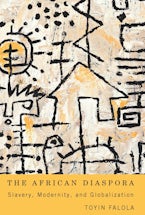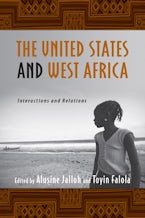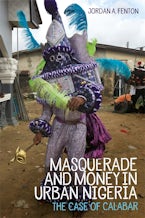
Title Details
244 Pages
22.8 x 15.2 cm
15 b/w, 4 line illus.
Series: Rochester Studies in African History and the Diaspora
Series Vol. Number:
52
Imprint: University of Rochester Press
The Fante and the Transatlantic Slave Trade
- Description
- Contents
- Reviews
Examines the history of the Fante people of southern Ghana during the transatlantic slave trade, 1700 to 1807.
The history of Ghana attracts popular interest out of proportion to its small size and marginal importance to the global economy. Ghana is the land of Kwame Nkrumah and the Pan-Africanist movement of the 1960s; it has been a temporary home to famous African Americans like W. E. B. DuBois and Maya Angelou; and its Asante Kingdom and signature kente cloth—global symbols of African culture and pride—are well known. Ghana also attracts a continuous flow of international tourists because of two historical sites that are among the most notorious monuments of the transatlantic slave trade: Cape Coast and Elmina Castles. These looming structures are a vivid reminder of the horrific trade that gave birth to the black population of the Americas.
The Fante and the Transatlantic Slave Trade explores the fascinating history of the transatlantic slave trade on Ghana's coast between 1700 and 1807. Author Rebecca Shumway brings to life the survival experiences of southern Ghanaians as they became both victims of continuous violence and successful brokers of enslaved human beings. The era of the slave trade gave birth to a new culture in this part of West Africa, just as it was giving birth to new cultures across the Americas. The Fante and the Transatlantic Slave Trade pushes Asante scholarship to the forefront of African diaspora and Atlantic World studies by showing the integral role of Fante middlemen and transatlantic trade in the development of the Asante economy prior to 1807.
Rebecca Shumway is assistant professor of history at the University of Pittsburgh.
The history of Ghana attracts popular interest out of proportion to its small size and marginal importance to the global economy. Ghana is the land of Kwame Nkrumah and the Pan-Africanist movement of the 1960s; it has been a temporary home to famous African Americans like W. E. B. DuBois and Maya Angelou; and its Asante Kingdom and signature kente cloth—global symbols of African culture and pride—are well known. Ghana also attracts a continuous flow of international tourists because of two historical sites that are among the most notorious monuments of the transatlantic slave trade: Cape Coast and Elmina Castles. These looming structures are a vivid reminder of the horrific trade that gave birth to the black population of the Americas.
The Fante and the Transatlantic Slave Trade explores the fascinating history of the transatlantic slave trade on Ghana's coast between 1700 and 1807. Author Rebecca Shumway brings to life the survival experiences of southern Ghanaians as they became both victims of continuous violence and successful brokers of enslaved human beings. The era of the slave trade gave birth to a new culture in this part of West Africa, just as it was giving birth to new cultures across the Americas. The Fante and the Transatlantic Slave Trade pushes Asante scholarship to the forefront of African diaspora and Atlantic World studies by showing the integral role of Fante middlemen and transatlantic trade in the development of the Asante economy prior to 1807.
Rebecca Shumway is assistant professor of history at the University of Pittsburgh.
Introduction
Selling Gold and Sellng Captives
Fanteland in the Atlantic World
A New Form of Government
Making Fante Culture
Conclusion
Selling Gold and Sellng Captives
Fanteland in the Atlantic World
A New Form of Government
Making Fante Culture
Conclusion
"Shumway's work is important in that it expands our understanding of Fante's evolution over the eighteenth century and thereby develops a more thorough understanding of the causes and consequences of the rise of Atlantic trade along the Gold Coast." H-NET
"Offers an important new analysis of the interaction of Fante and European societies in the long eighteenth century. Such work has been long overdue...This is a significant contribution to the literature which all serious scholars of the subject will want to engage with." ENGLISH HISTORICAL REVIEW
"This is a rich study, carefully conceived and argued." H-AFRICA
"[A] significant contribution...Shumway argues her case with an abundance of carefully marshalled evidence." LUCAS BULLETIN
"A valuable contribution to the history of modern-day Ghana." ECONOMIC HISTORY REVIEW
"Rebecca Shumway's The Fante and the Transatlantic Slave Trade is an elegantly written masterpiece of a crucial period in West African history when a coastal belt of European slave forts and African chiefdoms consolidated new forms of 'fetishism' and political economy." ANTHROPOLOGY OF THIS CENTURY
"[A] significant contribution. . . . Shumway argues her case with an abundance of carefully marshaled evidence." LUCAS BULLETIN
"Rebecca Shumway's The Fante and the Transatlantic Slave Trade is an elegantly written masterpiece of a crucial period in West African history when a coastal belt of European slave forts and African chiefdoms consolidated new forms of 'fetishism' and political economy." ANTHROPOLOGY OF THIS CENTURY
Paperback
9781580464789
January 2014
£28.99 / $36.95
Ebook (EPUB)
9781782045724
October 2011
£24.99 / $29.95
Ebook (EPDF)
9781580467391
October 2011
£24.99 / $29.95
Title Details
244 Pages
2.28 x 1.52 cm
15 b/w, 4 line illus.
Series: Rochester Studies in African History and the Diaspora
Series Vol. Number:
52
Imprint: University of Rochester Press














